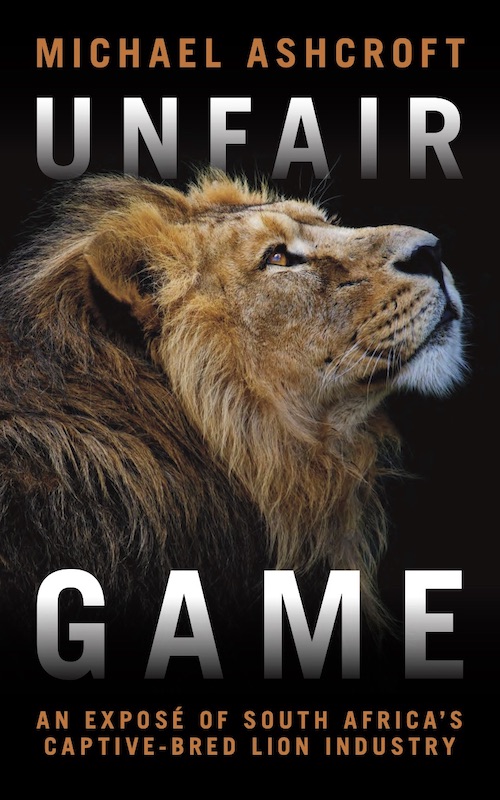 South Africans have a remarkable talent for frothing with indignant bluster over outrageous events, then fading into apathy before any real change occurs.
South Africans have a remarkable talent for frothing with indignant bluster over outrageous events, then fading into apathy before any real change occurs.
We do it with everything - rape, murder and rampant looting - with each fresh case hailed as the turning point sure to trigger some legal or behavioural epiphany. Except it never does.
That was my initial concern about Unfair Game, a book exposing South Africa’s appalling and secretive lion breeding industry. It will no doubt spark outrage and disquiet, yet it follows in the tracks of others, including the film Blood Lions by Ian Michler, and still the industry persists.
But Unfair Game is written by the UK’s Lord Michael Ashcroft, and perhaps his international clout will prove the tipping point in a country where an international spotlight burns those in power more than the opinions of their own citizens. South Africa stands to be ostracised and pilloried for its shocking treatment of lions, Ashcroft believes, reducing its iconic animal to factory fodder.
His writing is calm and fair, not given to hyperbole, and his prolific research draws from experts including conservationists, hunters, vets, lawyers and insiders to create an impossible-to-challenge picture of immense cruelty. He believes there are more than 300 lion-breeding farms in South Africa housing 12,000 captive animals. A few will be killed in hunts, but most will be stripped for their body parts in an abattoir.
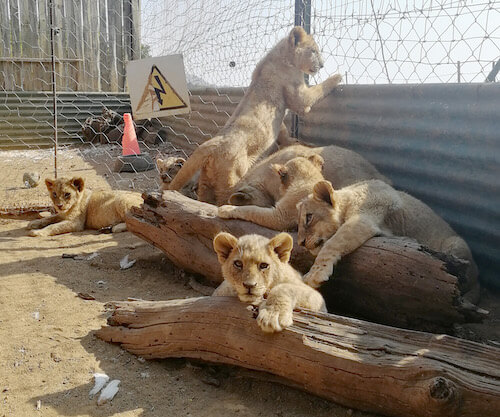 Ashcroft is a former deputy chairman of the UK’s Conservative Party turned international businessman and philanthropist, and a vocal campaigner on wildlife issues. Hopefully he has sufficient influence, money and bulletproof vests to continue campaigning until lion farming is eradicated.
Ashcroft is a former deputy chairman of the UK’s Conservative Party turned international businessman and philanthropist, and a vocal campaigner on wildlife issues. Hopefully he has sufficient influence, money and bulletproof vests to continue campaigning until lion farming is eradicated.
“Millions of people around the world have engaged with the social media campaign we launched. People are shocked by what we’ve revealed,” he told Business Day. “Those who were aware of the issue feel we broke new ground with our investigation; those who are new to it are appalled and angry.”
Unfair Game is a book in two parts, written after Ashcroft was horrified to hear about canned lion hunts. What he found led him down a different and even darker route.
With canned shoots already broadly condemned even by professional hunters, breeders now supply fewer lions to be killed in sham ‘hunts’ and instead sell their bones to Asia as traditional medicine - a demand that’s far more voracious and less conspicuous than the bloody mess of hunting. But lions bred purely to die in slaughterhouses are treated even more brutally than those that must look reasonably healthy for a hunter.
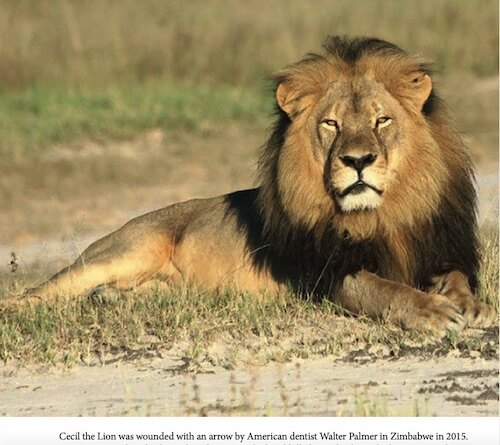 The second half unfolds like an exciting crime thriller as Ashcroft reveals two stings set up to expose the industry. You’re drawn into a cloak-and-dagger (well, khaki shorts and guns) adventure of subterfuge and sophisticated spyware, drones to capture secret footage, code names and safe houses. Ashcroft recruited a group of British ex-special forces who turned a chief player into an informer, and amassed incontrovertible evidence about illegal breeding, bone trading and canned hunting activities.
The second half unfolds like an exciting crime thriller as Ashcroft reveals two stings set up to expose the industry. You’re drawn into a cloak-and-dagger (well, khaki shorts and guns) adventure of subterfuge and sophisticated spyware, drones to capture secret footage, code names and safe houses. Ashcroft recruited a group of British ex-special forces who turned a chief player into an informer, and amassed incontrovertible evidence about illegal breeding, bone trading and canned hunting activities.
It’s fascinating and disturbing as the perpetrators are named and shamed, including supposedly family-friendly game reserves where the wholesale slaughter of lions is happening behind the scenes.
“Others have raised this issue before and some, like Roger Cook and Ian Michler, have made a very powerful contribution to this debate over the years,” Ashcroft said from his home in Belize. “But I’m not sure anybody else has ever worked with former Special Forces operatives to undertake a secret mission and infiltrated the lion farming business. The results speak for themselves. The NSPCA has launched a criminal investigation based on some of the evidence we obtained.”
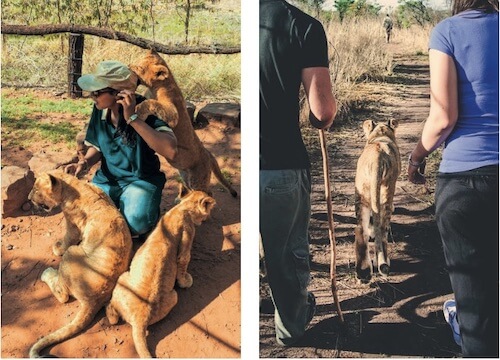 The more academic first half documents the rise of canned hunting, the morphing of the industry to serve the bone trade, and its links to lion cub petting, lion walking and voluntarism. If you’ve ever cuddled a cub at a ‘sanctuary’ you’ll feel guilty, and probably hoodwinked. Tourists who pay to interact with lion cubs are unwittingly perpetuating the industry, Ashcroft says.
The more academic first half documents the rise of canned hunting, the morphing of the industry to serve the bone trade, and its links to lion cub petting, lion walking and voluntarism. If you’ve ever cuddled a cub at a ‘sanctuary’ you’ll feel guilty, and probably hoodwinked. Tourists who pay to interact with lion cubs are unwittingly perpetuating the industry, Ashcroft says.
“All voluntourism programmes that I know of, and the tourism industry more generally, are at the root of this evil. Lie after lie is told by those running these programmes about where the cubs come from, why they have these cubs in the first place, where the cubs and lions will end up. Animal lovers are helping animal haters to get rich by exploiting lions. It’s sick.”
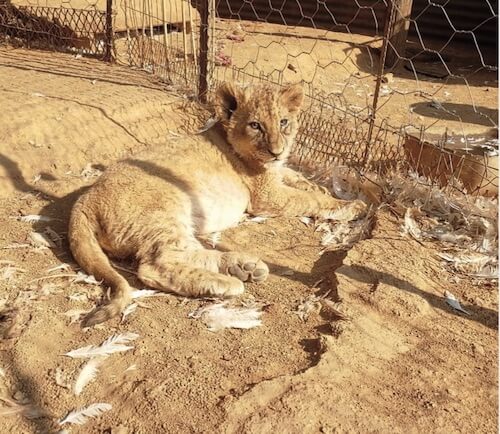 He also debunks the theory that captive breeding restocks the wild population – now down to just 3000 lions in South Africa – or protects wild animals by supplying factory-farmed victims instead. His team obtained evidence that wild lions are actually being kidnapped to improve the gene pool of the captive population.
He also debunks the theory that captive breeding restocks the wild population – now down to just 3000 lions in South Africa – or protects wild animals by supplying factory-farmed victims instead. His team obtained evidence that wild lions are actually being kidnapped to improve the gene pool of the captive population.
Those he’s attacking argue that fees paid by foreign hunters to shoot endangered animals goes towards conservation, and their claims sound persuasive. But Unfair Game repeatedly proves there is no conservation value whatsoever in breeding animals for the bullet.
“Any money generated by granting licences to people so that captive-bred lions can be shot in canned hunts goes into their pockets,” he says. He also cites the case of a ‘fair chase’ hunter in Botswana who failed to make a kill, and was brought to South Africa for a canned hunt so he didn’t go home empty handed.
Evidence gathered in the year-long investigation was presented to the police and rejected, which leads us straight back to South Africa’s notorious social apathy and ingrained corruption. The government is enabling the industry, raising questions of corruption and captured officials within conservation and policing agencies, Ashcroft warns.
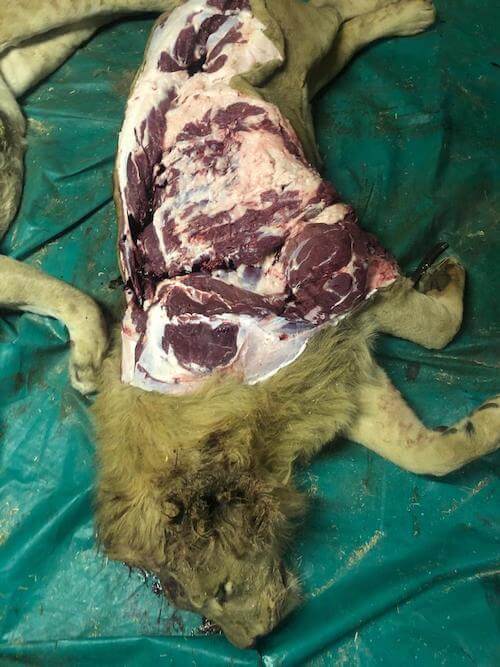 Its publication this month coincides perfectly with justified criticism stalking a high-level panel appointed by Environment Minister Barbara Creecy to review our wildlife laws. Wildlife organisations have exposed how its composition is skewed towards hunters and traders in body parts, likely to re-enforce the exploitation of wild animals as commercial goods rather than promote conservation.
Its publication this month coincides perfectly with justified criticism stalking a high-level panel appointed by Environment Minister Barbara Creecy to review our wildlife laws. Wildlife organisations have exposed how its composition is skewed towards hunters and traders in body parts, likely to re-enforce the exploitation of wild animals as commercial goods rather than promote conservation.
Equally disconcerting is that the panel is derailing a clear call to outlaw lion farming issued by the parliamentary portfolio committee on environmental affairs after a two-day session open to the public. The committee’s damning report said the ‘tragic story’ of captive breeding had no conservation value, was highly lucrative for very few people, and was inflicting irreparable damage on South Africa’s conservation image. It called for the Environment Department to review its policies with a view to ending the practice, not merely tinker with the regulations.
Ashcroft doubts the panel will take bold action to end the trade, but he’s sent his book to every panellist anyway. “The truth is simple,” he says. “Those who object to any element of South Africa’s lion industry do so on moral, ethical and welfare grounds. Those who argue in favour of having a lion industry in South Africa do so exclusively for financial reasons.”
• Unfair Game by Michael Ashcroft (Biteback Publishing, R275) is available in bookshops or via Amazon. All royalties will go to wildlife charities in South Africa. Order from Amazon here: Disturbing footage from the investigation can be seen here:
Photos: Supplied by Michael Ashcroft. Review first published in Business Day.